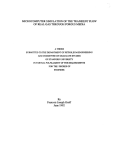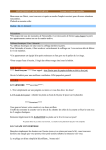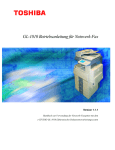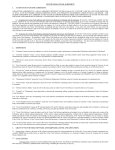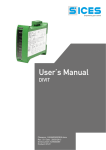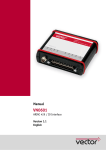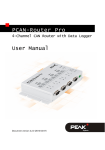Download 2 GL1000/GL1010 – Compact Logger
Transcript
User Manual GL1000/GL1010 – Compact Logger Version 1.10 English Imprint Vector Informatik GmbH Ingersheimer Straße 24 D-70499 Stuttgart The information and data given in this user manual can be changed without prior notice. No part of this manual may be reproduced in any form or by any means without the written permission of the publisher, regardless of which method or which instruments, electronic or mechanical, are used. All technical information, drafts, etc. are liable to law of copyright protection. © Copyright 2015, Vector Informatik GmbH. Printed in Germany. All rights reserved. 80353 User Manual GL1000/GL1010 – Compact Logger Table of Contents Table of Contents 1 Introduction 3 1.1 About this User Manual 1.1.1 Certification 1.1.2 Warranty 1.1.3 Support 1.1.4 Registered Trademarks 4 5 5 5 5 2 GL1000/GL1010 – Compact Logger 7 2.1 General Information 2.2 Features 2.2.1 2.2.2 2.2.3 2.2.4 2.2.5 2.2.6 2.2.7 2.2.8 2.2.9 2.2.10 2.2.11 2.2.12 2.2.13 2.3 Operating Modes 18 2.4 Piggybacks 19 2.5 Technical Data 21 2.6 Included with Delivery 21 3 Installation Configuration Programs 23 3.1 Overview 24 3.2 Installation Vector Logger Configurator 3.2.1 Requirements 3.2.2 Setup 3.2.3 Overview 3.2.4 Quick Start 24 24 24 25 26 3.3 Installation G.i.N. Configuration Program 3.3.1 Requirements 3.3.2 Setup 3.3.3 Overview 3.3.4 Quick Start 27 27 27 28 29 4 Index 31 8 9 9 10 11 12 13 13 14 14 15 16 16 17 17 Connectors SD/SDHC Memory Card Serial Number LED Display Digital Input/Output Analog Inputs Serial Interface Real-Time Clock with Battery Beep Wake-up / Sleep CCP/XCP Diagnostics LOGview Control © Vector Informatik GmbH Version 1.10 -I- User Manual GL1000/GL1010 – Compact Logger Introduction 1 Introduction In this chapter you find the following information: 1.1 About this User Manual Certification Warranty Support Registered Trademarks © Vector Informatik GmbH page 4 Version 1.10 -3- Introduction 1.1 User Manual GL1000/GL1010 – Compact Logger About this User Manual To find information quickly The user manual provides you the following access helps: > At the beginning of each chapter you will find a summary of the contents, > In the header you can see the current chapter and section, > In the footer you can see to which version the user manual replies, > At the end of the user manual you will find an index. Conventions In the two following charts you will find the conventions used in the user manual regarding utilized spellings and symbols. Style Utilization bold Blocks, surface elements, window- and dialog names of the software. Accentuation of warnings and advices. [OK] Push buttons in brackets File | Save Notation for menus and menu entries Windows Legally protected proper names and side notes. Source code File name and source code. Hyperlink Hyperlinks and references. <STRG>+<S> Notation for shortcuts. Symbol Utilization Here you can find additional information and hints that eases the work with the loggers. This symbol calls your attention to warnings. Here you can find additional information. Here is an example that has been prepared for you. Step-by-step instructions provide assistance at these points. Instructions on editing files are found at these points. This symbol warns you not to edit the specified file. -4- Version 1.10 © Vector Informatik GmbH User Manual GL1000/GL1010 – Compact Logger Introduction 1.1.1 Certification Certified Quality Vector Informatik GmbH has ISO 9001:2008 certification. Management System The ISO standard is a globally recognized standard. 1.1.2 Warranty Restriction of warranty We reserve the right to change the contents of the documentation and the software without notice. Vector Informatik GmbH assumes no liability for correct contents or damages which are resulted from the usage of the user manual. We are grateful for references to mistakes or for suggestions for improvement to be able to offer you even more efficient products in the future. 1.1.3 Support You need support? You can get through to our hotline at the phone number +49 711 80670-200 or you write an email to [email protected]. 1.1.4 Registered Trademarks Registered trademarks All trademarks mentioned in this user manual and if necessary third party registered are absolutely subject to the conditions of each valid label right and the rights of particular registered proprietor. All trademarks, trade names or company names are or can be trademarks or registered trademarks of their particular proprietors. All rights which are not expressly allowed, are reserved. If an explicit label of trademarks, which are used in this user manual, fails, should not mean that a name is free of third party rights. > Windows, Windows XP, Windows Vista, Windows 7 and Windows 8 are trademarks of the Microsoft Corporation. > CANoe, CANalyzer and CANape are trademarks of the Vector Informatik GmbH. © Vector Informatik GmbH Version 1.10 -5- User Manual GL1000/GL1010 – Compact Logger GL1000/GL1010 – Compact Logger 2 GL1000/GL1010 – Compact Logger In this chapter you find the following information: 2.1 General Information page 8 2.2 Features Connectors SD/SDHC Memory Card Serial Number LED Display Digital Input/Output Analog Inputs Serial Interface Real-Time Clock with Battery Beep Wake-up / Sleep CCP/XCP Diagnostics LOGview Control page 9 2.3 Operating Modes page 18 2.4 Piggybacks page 19 2.5 Technical Data page 21 2.6 Included with Delivery page 21 © Vector Informatik GmbH Version 1.10 -7- GL1000/GL1010 – Compact Logger 2.1 User Manual GL1000/GL1010 – Compact Logger General Information GL1000 The GL1000 is a data logger with USB interface which processes CAN messages with either 11-bit or 29-bit identifiers and LIN messages. Furthermore, received messages and analog values can be logged on an inserted SD card. The configuration of the logger is done with the Vector Logger Configurator or the G.i.N. configuration program. The installation is described in chapter 3. GL1010 The GL1010 is equivalent to the GL1000 and differs only in the design of the housing and the connections (watertight according to IP65). The SD card is located in the housing and is no longer accessible from the outside. The opening for the speaker is eliminated. Note: Please note that the housing of the GL1010 must not be opened under any circumstances, since otherwise the IP65 protection class of the data logger is no longer guaranteed. The SD/SDHC card, the piggybacks, and the battery may only be replaced by Vector Informatik GmbH. For more information, please contact the Vector Support. Figure 1 – GL1000 (left), GL1010 (right) Info: Due to the openings in the housing for the LED, leak tightness may not be guaranteed if the label is damaged. -8- Version 1.10 © Vector Informatik GmbH User Manual GL1000/GL1010 – Compact Logger 2.2 GL1000/GL1010 – Compact Logger Features 2.2.1 Connectors General information The loggers have the following connectors: > USB connector: data transfer between PC and logger > HD DSUB25 connector containing: 2 CAN channels 2 LIN channels 2 digital inputs/outputs 4 analog inputs Battery and ground Ignition > SD card slot (externally accessible for GL1000) DSUB25 pin assignment The pins of the HD DSUB25 connector have the following meaning. The colors refer to the included connection cable. Pin Assignment Color Pin Assignment Color 1 Battery white 14 Opt3 N.C. 2 RS232 Rx white/green 15 CAN1 High yellow 3 RS232 Tx N.C. 16 CAN1 Low green 4 GND brown 17 Opt4 N.C. 5 Opt1 N.C. 18 Opt5 N.C. 6 I/O 1 white/yellow 19 CAN2 High grey 7 GND brown 20 Wake black 8 I/O 2 brown/yellow 21 CAN2 Low pink 9 AnaIn 1 grey/pink 22 GND brown 10 AnaIn 2 red/blue 23 LIN 1 lilac 11 AnaIn 3 blue 24 LIN 2 red 12 AnaIn 4 brown/green 25 Opt6 N.C. 13 Opt2 N.C. The three GND pins are connected together internally and have the same potential as the power supply ground. Note: Transceivers with wake-up capability are supplied directly from the supply voltage of the logger. During logger start, for the TJA1041 and TJA1054 transceivers the supply voltage must not exceed 27 V in order to not damage the transceivers. After start and during operation for these transceivers a supply voltage of maximum 30 V can be applied. For a supply voltage of 27 V up to 30 V CAN we recommend for CAN high-speed the transceiver TJA1043. © Vector Informatik GmbH Version 1.10 -9- GL1000/GL1010 – Compact Logger Connection cable User Manual GL1000/GL1010 – Compact Logger The included connection cable has open wire ends. If single wires are not used, it is recommended to terminate them. This prevents short circuits between the open wires. At the same time the EMC properties are improved. Info: The connection cable does not match IP65. Caution: It is recommended to connect the logger to the same voltage supply (e.g. battery of the vehicle) as the vehicle or test equipment, respectively. If two different voltage supplies are used for the logger and the test equipment, the ground (GND) pins of the two voltage supplies must be connected. GL1010 USB connector It is recommended to protect the USB connector with a cap if no USB cable is connected. 2.2.2 SD/SDHC Memory Card SD and SDHC cards The logger supports industrial grade SD cards up to 2 GB. From serial number 220 and higher also industrial grade SDHC cards are supported (firmware V1.08 and higher is required). For the proper use only the industrial grade cards released by Vector may be used. These cards are listed below. Currently memory cards with industrial grade are available up to and including 16 GB. Recommended SD cards The following SD cards with industrial grade are recommended (see also section 2.5): > Xmore industrial 2 GB (SD-2G0-XIWE2, SD-2G0-XIWE21) > Cactus Industrial Grade 2 GB (KS 2GRI-800), some higher start-up time Recommended SDHC cards The following SDHC cards with industrial grade are recommended (see also section 2.5): > Xmore industrial 4 GB (SD-4G0-XIE6, SD-4G0-XIWE21, SD-4G0-XIE23) > Xmore industrial 8 GB (SD-8G0-XIE6, SD-8G0-XIWE21, SD-8G0-XIE23) > Xmore industrial 16 GB (SD-16G-XIE23) > Cactus Industrial Grade 4 GB (KS 4GRI-800) > Cactus Industrial Grade 8 GB (KS 8GRI-800) GL1000: Inserting and removing SD card The GL1000 has a push-and-pull card holder for inserting and removing the SD card. To insert the SD card, push it in until the locking mechanism engages securely. To remove the SD card, push it slightly into the card holder until it unlocks. Now, release the SD card. The card moves from its original position and can now be removed. Do not pull the SD card from the card holder forcefully, since this could cause mechanical damage! - 10 - Version 1.10 © Vector Informatik GmbH User Manual GL1000/GL1010 – Compact Logger GL1010: SD card GL1000/GL1010 – Compact Logger The SD card is already contained in the housing of the GL1010 and cannot be removed or replaced. Note: Please note that the housing of the GL1010 must not be opened under any circumstances, since otherwise the IP65 protection class of the data logger is no longer guaranteed. The SD/SDHC card may only be replaced by Vector Informatik GmbH. For more information, please contact the Vector Support. Data transfer The logged data can be downloaded from the SD/SDHC card in the GL1000/GL1010 or in an SD/SDHC card reader. In both cases for the download and the conversion the configuration program is required. It is not possible to access the logged data on the memory card directly through the Windows Explorer because of the logger’s own file system. Note: Laptops with an integrated SD card reader rarely cannot identify SD cards with a logger specific file system. In this case please use an external USB card reader. Caution: A formatted SD/SDHC card has to be empty before inserting it in the logger! The configured logger will delete all files if a formatted memory card is not empty! The logger deletes the Windows files and the file system on the memory card on start of logging mode if they exist. The logger uses its own file system that cannot be seen in the Windows Explorer. It is required to use a configuration program to download a configuration and upload logging files. 2.2.3 Serial Number Serial number The serial number is stored in the logger and is copied to the SD card after download of the configuration and start in logging mode. The configuration program reads out the serial number of the logger in the configuration mode. The serial number is displayed correctly, if an SD card is inserted and the logger was at least one time in the logging mode with this SD card. If this SD card is inserted in another logger and the logger is not started in logging mode afterwards, the serial number of the first logger will be displayed in the configuration program. © Vector Informatik GmbH Version 1.10 - 11 - GL1000/GL1010 – Compact Logger User Manual GL1000/GL1010 – Compact Logger 2.2.4 LED Display LED display LED USB The logger has five LEDs. LED 1 to LED 4 are free programmable. They can be used to display different states. LED USB indicates the USB connection to the PC. LED Color Programmable LED 1 Green Yes LED 2 Yellow Yes LED 3 Red Yes LED 4 Red Yes LED USB Green No This LED displays the state of the USB connection between the logger and the PC. Note, that this LED is not programmable. State Meaning On USB connected and SD card inserted. The logger is registered on the PC and ready for data transfer via USB. Note: The LED will be on (determined by the system) if the SD card is removed in this state. Slow blinking (1 Hz) USB connected, but SD card is not inserted. The logger is registered on the PC. Due to missing SD card no data transfer is possible. Note: If an SD card is inserted in this state, the LED will be switched on. The logger is now ready for data transfer. LEDs 1–4 - 12 - Fast blinking Data transfer Off All other cases In the following situations in the Logging mode the display of LEDs 1–4 is fix. State Meaning Running light over LEDs 1–4 At the first start in Logging mode after a configuration download from PC a running light over LEDs 1–4 indicates the internal update and setup of ring buffers on the memory card (firmware up to 0.96). Simultaneous blinking of LEDs 1–4 Fault due to missing or defective SD card. Version 1.10 © Vector Informatik GmbH User Manual GL1000/GL1010 – Compact Logger GL1000/GL1010 – Compact Logger 2.2.5 Digital Input/Output Digital IO The logger supports two pins which can be used either as digital inputs or as digital outputs. Technical data Using as input Operating voltage range 0 V…36 V Pull-up resistor 10 kΩ to 5 V A digital input can be used e.g. as external trigger. In unconnected state the digital inputs are set to High (TRUE). After connecting the input with GND the status is set to Low (FALSE). Using as output Threshold Low → High 1.9 V Threshold High → Low 0.5 V Sampling rate 1 kHz When used as a digital output, the pin is connected to GND when the output is switched on (so called “low side switch”). To switch a consumer it is necessary to connect it between the pin of the digital output and the battery. Current when switched on Max. 500 mA Circuit time Typ. 1ms 2.2.6 Analog Inputs Analog inputs The logger has four independent analog channels which can be configured separately. Technical data Voltage range 0 V … 16 V Resolution 10 bit Precision 1% Sampling rate Max. 1 kHz Type Single-ended to ground Input resistance 155.6 kΩ Reverse-polarity protection -50 V … +50 V Averaging It is possible to average the measured analog inputs over a defined sampling period between 1 kHz and 1 Hz. E.g. for a 1 Hz sampling frequency, the measured values are averaged over the last second. The internal sampling rate is 1 kHz for each channel. © Vector Informatik GmbH Version 1.10 - 13 - GL1000/GL1010 – Compact Logger User Manual GL1000/GL1010 – Compact Logger 2.2.7 Serial Interface RS232 The serial interface with the Rx and Tx lines is a logging interface only. The baudrate of the interface can be configured. Received data can be stored on the SD card as CAN messages. Info: The serial interface cannot be used to download a configuration or upload logging data. 2.2.8 Real-Time Clock with Battery Real-time clock The GL1000/GL1010 has an internal real-time clock, which is battery supplied, and thus continues running even if the logger is disconnected from power supply. The real-time clock inside the logger is required to store the date and time together with the logged data. It is recommended to set the real-time clock before first logging. The configuration of the clock is done with the configuration program (SD card must be inserted). After setting the real-time clock the logger is switched off. Older logger under Windows 7 and Windows 8 When the real-time clock of older GL1000/GL1010 is set under Windows 7 / Windows 8, the concluding ejection of the logger must be performed manually for hardware reasons. This pertains to the following serial numbers: > GL1000 up to and including serial number 028069-001339 > GL1010 up to and including serial number 028081-100105 The affected loggers must be connected to the USB and be supplied with power via the DSUB25 connector before the time is set. After the time is set with the configuration program, the USB connection must be disconnected immediately so that the time will be applied. Under Windows XP, the USB connection is adequate for setting the time for all GL1000/GL1010; the same applies under Windows 7 / Windows 8 for newer serial numbers than those indicated above. Battery The internal battery supplies the real-time clock only. The battery has a typical durability of approximately 5-10 years under the following conditions: T = +40°C to +80°C for at most 40 hours per week T = -40°C to +40°C in the rest of the time GL1010: Battery - 14 - Please note that the housing of the GL1010 must not be opened under any circumstances, since otherwise the IP65 protection class of the data logger is no longer guaranteed. The battery may only be replaced by Vector Informatik GmbH. For more information, please contact the Vector Support. Version 1.10 © Vector Informatik GmbH User Manual GL1000/GL1010 – Compact Logger GL1000: Replacing battery GL1000/GL1010 – Compact Logger The battery of the GL1000 can be is exchanged after life cycle end. Notes: > First read the installation instruction completely. > The case has to be opened to exchange the piggybacks. > This must be done very cautiously and carefully. Caution: When performing this operation be sure not to touch the top or bottom of the boards (logger main board or piggybacks). The battery is exchanged as follows: 1. First remove the two black decorative caps and the screws from the bottom cover of the GL1000. The bottom cover contains the DSUB25 connector. Carefully pull out the main circuit board. 2. You will find mounting location almost at the center of the main circuit board, partly covered by the piggybacks (see green circle in Figure 2). 3. Remove the piggybacks for easier access to the battery. 4. Remove the battery carefully from the mounting location. 5. Insert the replacement battery. Look out for the correct polarity, + must be on top. Please handle the contact spring with care. Do not bend it too much and make sure the spring has contact to the new battery after replacement. 6. Place the GL1000 main board back in the housing verifying that it is inserted properly. This operation involves placing the housing on a table with its back side (side with the bar code) facing up. Then the main board is inserted into the lower guide rail with the piggybacks facing up. 7. It should be possible to slide the main board in the housing up to a few millimeters from the end without forcing it in. Close the housing by applying light pressure, and then secure it with the appropriate screw fasteners. The screws should be secure but not excessively tight. 8. Please also attach the two black decorative caps. Dispose of the removed battery according to the applicable laws (e.g. the Battery Law in Germany). 2.2.9 Beep Beep The GL1000/GL1010 has a speaker that acoustically alerts the user e.g. in case of a trigger. Triggers and beep can be defined using the configuration program. Because the opening in the housing has been eliminated, the signal tone of the speaker is only audible to a limited extent in the GL1010. © Vector Informatik GmbH Version 1.10 - 15 - GL1000/GL1010 – Compact Logger User Manual GL1000/GL1010 – Compact Logger 2.2.10 Wake-up / Sleep Wake-up The GL1000/GL1010 starts after power on. A sleeping logger wakes up > after reception of a CAN message > after reception of a LIN message > positive edge on the wake line (clamp 15) > wake-up timer via real-time clock The logger has to be equipped with CAN transceivers with wake-up capability to support the wake-up functionality on CAN (see section 2.4 Piggybacks). The wake-up line resists the full board voltage. If the GL1000 is supplied from clamp 30, the wake-up line can be connected with clamp 15. Thereby the GL1000 will be woken up immediately at switching on the ignition even if no activity is on the wake-up compatible busses or the busses are not connected. Sleep The logger can be configured to go to sleep mode if no CAN and LIN messages are received for a defined time. This time can be configured (max. 18000 s = 5 h). 2.2.11 CCP/XCP Overview The GL1000/GL1010 supports the recording of CCP/XCP data in DAQ and polling mode. The A2L file is inserted directly in the Vector Logger Configurator and the signals to be measured are selected. For ECUs which are protected via Seed & Key procedure CANape is also required to program the Seed & Key algorithm and create an SKB file containing this algorithm. This SKB file is added to the logger configuration. CCP/XCP is available as option. The license must be installed in the logger. The license also includes the Seed & Key support. FAQ - 16 - Measurement mode DAQ (data aquisition) mode, polling mode Supported CCP version CCP 2.0 und CCP 2.1 Supported XCP version XCP 1.0 and higher Support CANape CANape V6.0 or higher for ECUs without Seed & Key CANape V7.0 or higher for ECUs with Seed & Key CANape V13.0 or higher for polling mode A2L file Direct import in Vector Logger Configurator Import in CANape still available Number of ECUs Multiple ECUs possible Version 1.10 © Vector Informatik GmbH User Manual GL1000/GL1010 – Compact Logger GL1000/GL1010 – Compact Logger 2.2.12 Diagnostics Overview The GL1000/GL1010 supports the logging of diagnostic data via CAN bus. The diagnostic descriptions (CDD, ODX, PDX, MDX) are read into the Vector Logger Configurator. These files are necessary to set the communication parameters and to select the diagnostic service requests that would be sent on different events. The analysis is supported in CANoe/CANalyzer. FAQ Diagnostic descriptions CDD (CANdela diagnostic descriptions) up to V7.1 ODX/PDX V2.0.1 and V2.2.0 MDX V3.0 Supported transport protocol ISO-TP Supported addressing modes Normal Normal fixed Extended Supported diagnostic protocols KWP2000, UDS Seed & Key Not supported Number of ECUs Several ECUs on different CAN buses possible 2.2.13 LOGview Control Overview The GL1000/GL1010 supports the connection of a LOGview display. The connection is made via CAN channel CAN2 thus CAN2 cannot longer be used unlimited. CAN2 can be used additionally for the logging of CAN messages of a CAN network, if the CAN network will not be disturbed by CAN messages (standard IDs 0x400 – 0x43F) that are transmitted between logger and display. Precondition therefor is that the network uses the required LOGview baud rate of 500 Kbit/s. The required bus terminating resistor of 120 Ohm is installed internally within the LOGview. The CAN data traffic between GL1000/GL1010 and LOGview will not be logged and it will not influence the sleep behavior of the logger. The data traffic is also “hidden” for the LTL configuration. Electrical connection For the electrical connection of the LOGview to the logger, a 5-pin Binder connector must be wired with the DSUB25 connector of the logger. Therefor two variants are possible that can be selected depending on the use case. © Vector Informatik GmbH Version 1.10 - 17 - GL1000/GL1010 – Compact Logger Variant 1 User Manual GL1000/GL1010 – Compact Logger The display is on if the ignition (clamp 15) is on. LOGview Pin Color Description GL1000 DSUB25 Pin 1 gray On/Off N.C. 2 brown GND, together with vehicle ground 4 (GND) 3 yellow CAN High 19 (CAN2 High) 4 green CAN Low 21 (CAN2 Low) 5 white Vbatt, together with clamp 15 of the vehicle 20 (Wake) Additionally the GL1000/GL1010 must be supplied at least via PIN 1 (battery) of the DSUB25 connector from the vehicle. Variant 2 The display is on if the logger is awake. LOGview Pin Color Description GL1000 DSUB25 Pin 1 gray On/Off 6 (I/O 1) 2 brown GND, together with vehicle ground 4 (GND) 3 yellow CAN High 19 (CAN2 High) 4 green CAN Low 21 (CAN2 Low) 5 white Vbatt, together with clamp 30 of the vehicle 1 (battery) This variant requires an additional resistor of 33 kOhm between pin 4 and 6 of the DSUB25 connector. Without this resistor the LOGview is permanently on, which can be identified by the active background illumination. Additionally with this variant the LOGview can be switched on and off via LTL programming (see LTL user manual). 2.3 Operating Modes Overview The GL1000/GL1010 supports two operating modes, which are switched by using the USB connection and power supply respectively. USB connection Voltage supply Mode yes optional Configuration mode no yes Logging mode Configuration mode In the Configuration mode the logger can be configured with the configuration program. The configuration can be downloaded to the logger. Logging data from the SD card can be uploaded to the PC. Logging mode The Logging mode enables the PC independent usage of the logger and allows the logging of CAN, LIN and analog values. For this case the logger must be unplugged from the USB connector of the PC. The voltage supply is done externally by the DSUB25 connector. - 18 - Version 1.10 © Vector Informatik GmbH User Manual GL1000/GL1010 – Compact Logger 2.4 GL1000/GL1010 – Compact Logger Piggybacks Piggybacks A piggyback is a plug-in PC-board which implements the interconnection of the logger to a specific CAN bus by the use of various transceivers. The piggybacks are also used in other loggers. Available piggybacks for the GL1000 series: CAN Piggyback Transceiver Description Wake-up 1 TJA1043 CAN High-speed Yes 2 Piggyback 1042 TJA1042 CAN High-speed No Piggyback 1050 TJA1050 CAN High-speed No Piggyback 1055 TJA1054 CAN Low-speed Yes Piggyback Single Wire TLE6255G CAN Single Wire Yes Piggyback Truck Trailer WABCO CAN Truck&Trailer Yes Piggyback 1043 3 1 Piggyback 1043 as successor of Piggyback 1041 2 Piggyback 1042 as successor of Piggyback 251 3 Piggyback 1055 as successor of Piggyback 1054 Note: Transceivers with wake-up capability are supplied directly from the supply voltage of the logger. During logger start, for the TJA1041 and TJA1054 transceivers the supply voltage must not exceed 27 V in order to not damage the transceivers. After start and during operation for these transceivers a supply voltage of maximum 30 V can be applied. LIN transceiver The LIN transceivers TJA1020/TJA1021 are already mounted on the main board of the GL1000/GL1010. Therefore LIN piggybacks are not needed. LIN level The LIN transceivers are supplied from the supply voltage. On this way reference voltage for the LIN levels and supply voltage have the same value. For example if the logger is supplied with 24 V, the reference value for LIN is also 24 V. GL1010: Piggybacks Please note that the housing of the GL1010 must not be opened under any circumstances, since otherwise the IP65 protection class of the data logger is no longer guaranteed. The piggybacks may only be replaced by Vector Informatik GmbH. For more information, please contact the Vector Support. GL1000: Replacing piggybacks The CAN piggybacks can be exchanged for the GL1000. The installed piggybacks are automatically detected (“plug & play”). Notes: > First read the installation instruction completely. > The case has to be opened to exchange the piggybacks. > This must be done very cautiously and carefully. Caution: When performing this operation be sure not to touch the top or bottom of the boards (logger main board or piggybacks). © Vector Informatik GmbH Version 1.10 - 19 - GL1000/GL1010 – Compact Logger User Manual GL1000/GL1010 – Compact Logger Now proceed as follows: 1. First remove the two black decorative caps and the screws from the bottom cover of the GL1000. The bottom cover contains the DSUB25 connector. Carefully pull out the main circuit board. 2. You will find the mounting location for channel 1 close to the center of the main circuit board and the mounting location for channel 2 close to the edge of the main circuit board. The locations are marked red in Figure 2. 3. Remove the piggyback carefully from the mounting location. 4. Insert the replacement piggyback. When doing this please make sure that the single and dual-row connectors are not laterally shifted. 5. Place the GL1000 main board back in the housing verifying that it is inserted properly. This operation involves placing the housing on a table with its back side (side with the bar code) facing up. Then the main board is inserted into the upper guide rails with the piggyback facing up. 6. It should be possible to slide the main board in the housing up to a few millimeters from the end without forcing it in. Close the housing by applying light pressure, and then secure it with the appropriate screw fasteners. The screws should be secure but not excessively tight. 7. Please also attach the two black decorative caps. Layout GL1000/GL1010 Figure 2 – Layout GL1000/GL1010 - 20 - Version 1.10 © Vector Informatik GmbH User Manual GL1000/GL1010 – Compact Logger 2.5 GL1000/GL1010 – Compact Logger Technical Data Start-up time PC interface USB 2.0 Channels 2 CAN channels (via piggybacks) 2 LIN channels Analog inputs 4 inputs: - Resolution 10 bit (1% precision) - Sampling rate 1 kHz - Voltage range 0 V…16 V Digital inputs/outputs 2 inputs/outputs, 0 V…36 V Start-up time Typ.150 ms with delivered 2 GB Xmore SD card, time varies with capacity and type of the SD/SDHC card Power consumption Typ. 660 mW, max. 1100 mW Current consumption Operation: Sleep mode: Temperature range GL1000: -40°C…+85°C depending on SD card GL1010: -20°C…+80°C (because of connector) USB interface: 0°C…+70°C Power supply 5 V…30 V, typ. 12 V Shut-down voltage 4.5 V Dimensions (LxWxH) GL1000: approx. 107 mm x 85 mm x 35 mm GL1010: approx. 130 mm x 85 mm x 35 mm Battery Lithium primary cell, BR2032 type typ. 55 mA at 12 V DC typ. 160 µA (2x CAN and 2x LIN) Data is recorded after the given start-up time if the GL1000/GL1010 already contains a configuration. Updating the configuration or using a new SD card increases this start-up time. Cross reference: The recommended SD/SDHC cards are listed in section 2.2.2 SD/SDHC Memory Card. 2.6 Included with Delivery Standard scope of delivery > GL1000/GL1010 Logger > Vector Logger Configurator on CD > G.i.N. configuration program on CD > Manuals on CD > USB cable > 2 GB SD memory card > Connection cable (open ends) > Mounting brackets (GL1000 only) Optional > CCP/XCP license for CAN © Vector Informatik GmbH Version 1.10 - 21 - User Manual GL1000/GL1010 – Compact Logger Installation Configuration Programs 3 Installation Configuration Programs In this chapter you find the following information: 3.1 Overview page 24 3.2 Installation Vector Logger Configurator Requirements Setup Overview Quick Start page 24 3.3 Installation G.i.N. Configuration Program Requirements Setup Overview Quick Start page 27 © Vector Informatik GmbH Version 1.10 - 23 - Installation Configuration Programs 3.1 User Manual GL1000/GL1010 – Compact Logger Overview Overview This instruction describes the installation of the software package for the GL1000/GL1010 containing: > Vector Logger Configurator Graphic user interface for easy configuration > G.i.N configuration program User interface to create complex configurations with LTL (Log Task Language) The programs are included with delivery. Vector Logger Configurator The Vector Logger Configurator offers a wide range of features to easily create configurations for the logger. The Vector Logger Configurator also supports the download of the configuration and the upload of logging data including the export to different file formats. Additionally the configuration can be saved as LTL code to be used in the G.i.N. configuration program. G.i.N. configuration program The G.i.N. configuration program can be used as configuration program for high end configurations. It offers full support of all features available with LTL (Log Task Language). This program can be used to import LTL code from the Vector Logger Configurator or from existing configurations written in LTL or to write own configurations in LTL. 3.2 Installation Vector Logger Configurator Overview This instruction describes the installation of the Vector Logger Configurator 2.1 or higher for the GL1000/GL1010 containing: > Vector Logger Configurator Logging configuration > Online help for the Logger Configurator > User manual for the Logger Configurator > This user manual 3.2.1 Requirements Operating system The following software requirements must be fulfilled to run the Vector Logger Configurator: Windows XP SP3, Windows Vista SP1, Windows 7 / Windows 8 (32/64 bit) Restriction Windows 8: AUTOSAR databases are not supported. 3.2.2 Setup The Vector Logger Configurator is installed as follows. 1. Execute the setup, which is found on the installation CD: .\VLConfig\Setup.exe 2. Please, follow the instructions in the setup program to complete the installation. 3. After successful installation, the Vector Logger Configurator can be found in the start menu (if selected during installation). - 24 - Version 1.10 © Vector Informatik GmbH User Manual GL1000/GL1010 – Compact Logger Installation Configuration Programs 3.2.3 Overview About Vector Logger Configurator Vector Logger Configurator enables the configuration of the loggers and offers a wide range of settings. You may set baud rates for CAN and LIN, define triggers and filters, set LEDs and manage logging files on the SD card. Furthermore for the CAN bus diagnostics and CCP/XCP can be configured. For CCP/XCP the logger needs a installed license. For Seed & Key CANape is required. Vector Logger Configurator also supports trigger and filter access by symbolic names defined in CAN and LIN databases. Main features are: > Customizable filters for CAN and LIN messages > Customizable triggers > Support of CAN and LIN databases > Diagnostic support > File management > CCP/XCP (optional) Device Information The Vector Logger Configurator can read out hardware information from the logger. Connect the GL1000/GL1010 with inserted SD card via USB and select the item File Manager|Device Information in the list view on the left hand side. Cross reference: The Vector Logger Configurator is described in detail in the user manual of this configuration program. The user manual is available as PDF and can be opened via the program group in the start menu. © Vector Informatik GmbH Version 1.10 - 25 - Installation Configuration Programs 3.2.4 User Manual GL1000/GL1010 – Compact Logger Quick Start Quick start Follow the instructions below to configure the logger, start logging and read out logging data. Caution: A formatted SD card has to be empty before inserting in the logger! The configured logger will delete all files if a formatted SD card is not empty! The logger deletes the Windows files and the file system on the SD card on start of logging mode if they exist. The logger uses its own file system that cannot be seen in the Windows Explorer. It is required to use the Vector Logger Configurator to download a configuration and upload logging files. 1. Start the program. 2. Open a new configuration via the menu File|New Project…. Select in the displayed dialog the logger type. 3. Select suitable baud rates for CAN and/or LIN (Hardware|CAN Channels and/or Hardware|LIN Channels), respectively. 4. Select the timeout to sleep mode (Hardware|Settings). 5. Configure the logger for a permanent logging of all data from switching on to switching off of the logger by activating the Use permanent logging option in Logging|Triggers. 6. Insert an empty SD card into the GL1000. The SD card is already included in the GL1010. 7. Connect the logger to PC via USB cable. If the logger is not automatically detected, press <F5> to refresh the display of connected logger devices. 8. Download the configuration via menu Configuration|Write to Device…. 9. Set the real-time clock via menu Device|Set Real-Time Clock… (recommended before first logging). 10. Disconnect the logger from the PC. 11. Connect the logger e.g. to your test system (CAN bus). Switch power on via connecting cable on DSUB25. 12. Start logging. LED1 flashes permanently (standard setting for new configurations, can be configured). 13. Stop logging by switching off CAN. Wait until the logger goes to sleep mode (CAN transceiver with wake-up capability necessary) i.e. LED1 must be off. 14. Connect the logger to PC via USB cable. 15. Open the File Manager node in the tree view. 16. Click on Logger Device. Now the logging files are displayed. 17. Select in the General Settings the destination folder and the format for the converted files. 18. Select in the Advanced Settings the options for conversion. 19. Click on the [Convert] button to start the readout and conversion of all data. The files will be located in <Destination folder>/<Destination subdirectory>. - 26 - Version 1.10 © Vector Informatik GmbH User Manual GL1000/GL1010 – Compact Logger 3.3 Installation Configuration Programs Installation G.i.N. Configuration Program Overview This instruction describes the installation of the G.i.N. Configuration Program for the GL1000/GL1010 containing: > G.i.N. configuration program Logging configuration > G.i.N. user manuals for the configuration program and the hardware 3.3.1 Requirements Operating system The following software requirements must be fulfilled to run the G.i.N. configuration program: Windows XP SP2, Windows 2000, Windows Vista, Windows 7 3.3.2 Setup Follow the instructions below to install the G.i.N. configuration program: 1. Execute the setup, which is found on the installation CD: .\GiNconf\setup.exe 2. Please, follow the instructions found there to complete the installation. 3. After successfully installation, the G.i.N. configuration program can be found in the start menu. © Vector Informatik GmbH Version 1.10 - 27 - Installation Configuration Programs User Manual GL1000/GL1010 – Compact Logger 3.3.3 Overview About G.i.N. configuration program The G.i.N. configuration program enables the configuration of the loggers and offers a wide range of settings via LTL (Log Task Language). You may set baud rates for CAN and LIN, define triggers and filters, set LEDs and manage logging files on the SD card. CCP/XCP can also be configured with the means of CANape, if the license is installed. G.i.N. configuration program also supports trigger and filter access by symbolic names defined in CANdb databases. Main features are: > Customizable filters for CAN and LIN messages > Customizable complex triggers > Support of databases > File management > CCP/XCP (optional) Cross reference: The G.i.N. configuration program is described in detail in the LTL user manual of the configuration program. The LTL user manual is available as PDF after installation of the program and can be called by the Help menu. - 28 - Version 1.10 © Vector Informatik GmbH User Manual GL1000/GL1010 – Compact Logger Installation Configuration Programs 3.3.4 Quick Start Quick start Follow the instructions below to configure the logger, start logging and readout logging data. Warning: A formatted SD card has to be empty before inserting in the logger! The configured logger will delete all files if a formatted SD card is not empty! The logger deletes the Windows files and the file system on the SD card on start of logging mode if they exist. The logger uses its own file system that cannot be seen in the Windows Explorer. It is required to use the G.i.N. configuration program or the Vector Logger Configurator to download a configuration and upload logging files. 1. Start the program. 2. Create a new project (File|New Project). Select the project path and the device GL1000. 3. Create a new source file (File|New File) and set the baud rate for CAN and the timeout for sleep mode, e.g. SYSTEM Can1Timing = Timing500K Can2Timing = Timing500K SleepSeconds = 5 END 4. Save the file (File|Save File as) as LTL file in your project directory. 5. Compile this file via Project|Compile or press [F9]. A COD file is created. 6. Insert an empty SD card in the logger. The SD card is already included in the GL1010. 7. Connect the logger to PC via USB cable. 8. Download the COD file with [F10] or via Project|Compile and Download. 9. Disconnect the logger from PC. 10. Connect the logger e.g. to your test system (CAN bus). Switch power on via connecting cable on DSUB25. 11. Start logging. 12. Stop logging by switching off CAN. Wait until the logger goes to sleep mode (CAN transceiver with wake-up capability necessary). 13. Connect logger to PC via USB cable. 14. Start the control program with [F11] or via Project|Run Control Program. Select Read out and Export after readout for the CAN logfile and click on [OK]. 15. Select the destination directory for the logging files. The upload is started afterwards. 16. The log files are uploaded in a raw format and displayed in the tree view under Logfiles GIN-Logger. 17. After readout the Export dialog is automatically displayed. Select the file format and export parameters and click on [OK]. The raw log file is now converted to the selected file format. © Vector Informatik GmbH Version 1.10 - 29 - User Manual GL1000/GL1010 – Compact Logger Index 4 Index A M Analog inputs ......................................................13 Memory cards .................................................... 10 B O Battery................................................................. 14 Operating modes ............................................... 18 Beep.................................................................... 15 P C Piggybacks ......................................................... 19 CAN .................................................................... 19 Pin assignment .................................................... 9 CCP/XCP ............................................................ 16 Configuration mode ............................................18 Connection cable ................................................10 Connectors ........................................................... 9 Q Quick start .................................................... 26, 29 R Real-time clock .................................................. 14 D Delivery ............................................................... 21 Requirements ............................................... 24, 27 Device information ..............................................25 S Diagnostics .........................................................17 SD/SDHC ........................................................... 10 Digital input/output ..............................................13 Serial interface ................................................... 14 DSUB25 ................................................................ 9 Serial number ..................................................... 11 Sleep .................................................................. 16 F Features ................................................................ 9 G GiN Configuration Program ................................27 L Start-up time ...................................................... 21 Support ................................................................ 5 T Technical data .................................................... 21 Transceiver ........................................................ 19 Layout GL1000/GL1010 .....................................20 LED ..................................................................... 12 LIN ...................................................................... 19 V Vector Logger Configurator ............................... 24 Logging mode .....................................................18 W LOGview ............................................................. 17 Wake-up ............................................................. 16 © Vector Informatik GmbH Version 1.10 - 31 - Get more Information! Visit our Website for: > News > Products > Demo Software > Support > Training Classes > Addresses www.vector.com



































